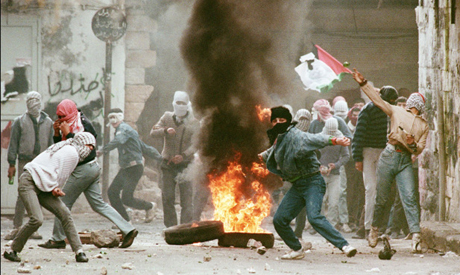
Palestinians in Nablus throw stones at Israeli soldiers on 29 January 1988. (AFP)
The de facto paralysis surrounding the peace process and the unlikelihood of any radical change in the Israeli attitude is increasing the sense of frustration and indignation among Palestinians.
Add to this the continued expansion of Israeli settlements in the West Bank and the international community’s inability to rein in Israel on the matter and it becomes hard to see how the current cycle of despair can be broken.
Some Palestinian leaders have openly voiced a conviction that without a "new extended round of resistance," nothing would move and nothing would work even "if negotiated for a hundred years."
This seems to be the view of Khalida Jarrar, a Legislative Council member representing the Popular Front for the Liberation of Palestine. She has argued that it is futile and irresponsible to keep talking with the Israelis while they themselves keep stealing Palestinian lands and building additional colonies on stolen land.
"What we (the Palestinian Authority) are doing is stupid, self-defeating and counterproductive. We have conducted negotiations for so many years, and all we see is that our horizons are getting narrower and our homeland is getting smaller and smaller.
"We should realize that negotiations alone don't liberate occupied homelands and that resistance in all its shapes and forms is what really forces the occupying powers to give up and give in to the peoples' aspirations and demands for freedom."
Jarrar was also quoted by the Maan news agency as saying that "we are already facing a pre-intifada mode” and that “the renewal of resistance is not a matter of if, but of when it will take place."
The PFLP has recently suspended its membership of the PLO, reportedly in protest of the PLO leadership’s freezing of funding allocated to the group, a decision described by Jarrar as political blackmail. PFLP officials refute this assessment and assert the suspension is a result of the "futile" political line adopted by the Palestinian Authority.
Disillusionment with the Palestinian predicament is by no means confined to the PFLP; there are also "currents" within Fatah which also advocate the renewal of the Intifada.
In recent weeks, spokesmen for the dissolved Al-Aqsa Martyrs Brigades, the erstwhile military wing of the Fatah movement, issued statements warning they were willing and ready to resume the struggle if all doors were shut in the face of the Palestinian people.
One spokesman was quoted as saying that "it would be foolhardy to expect a true Palestinian state without more armed struggle. Besides, America which can't even force Israel to freeze the building of a few settler units here and there in the West Bank is unlikely to force Israel to withdraw to the 1967-lines.
"So resistance is inevitable. Yes, it is costly, but freedom is too precious and we must not flinch from paying the price for it."
There are two more important factors militating toward an outbreak of violence in the occupied territories. Israel of late has escalated its attacks against Palestinians. In the Gaza strip, the killing of Palestinians, militants as well as civilians, including innocent fishermen, has become a nearly daily occurrence.
This is despite the fact that the Gaza-based government of Hamas is effectively discouraging the firing of projectiles onto Israel. Some Israeli sources have suggested that Israel is deliberately upping the ante in Gaza in order to create a pretext for a new invasion of the coastal enclave which would "finish what the 2008-2009 blitz didn't or couldn't achieve."
The Israeli army has already decided to deploy tanks equipped with an active armour protection system known as Windbreaker to the border area along the Gaza Strip.The deployment will reportedly begin next month following intelligence assessments that the threat of anti-tank missile attacks in the area is on the rise.
However, the deployment of these "super tanks" seems to have more to do with "tendentious provocations" than with any legitimate defensive posture on Israel's part.
All this feeds in and from a conviction widespread among Palestinians that national unity is only possible through resistance. This view is especially prevalent within Hamas, which, like the PFLP, views peace negotiations without resistance as absurd.
Short link: